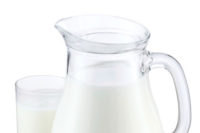Organic Milk More Nutritious
"Grazing dairy cows on grass or grass and clover swards produces milk with a healthier fatty acid profile and higher levels of fat soluble vitamins and antioxidants," notes Gillian Butler, livestock project manager for the Nafferton Ecological Farming Group at Newcastle University, who led the study.
This study points to the diet of organic cows -- fresh grass and clover -- as the major reason for these nutritional benefits.
"This study joins a growing body of science indicating strong links between what we feed our farm animals and the nutritional quality of what they feed us. Not only are you what you eat, but you are what what you eat eats too," says Michael Pollan, author of the bestsellers The Omnivore's Dilemma and In Defense of Food.
Consumers who purchase organic foods often do so for various reasons, ranging from a desire to support an ecologically sustainable agricultural system, the humane treatment of livestock, to wanting to reduce their exposure to dangerous pesticide residues. Studies showing that organically produced foods are also of higher nutritional quality offer another reason for consumers to buy organic.
"Organic consumers can be very confident that the vast majority of brand name organic milk comes from cows that were given the opportunity to graze on fresh pasture whenever possible," says Mark Kastel, codirector of The Cornucopia Institute, a farm and food policy research group based in Cornucopia, Wisconsin.
Some large industrial-scale organic dairies, or "factory farms," milking thousands of cows each, however, have come under fire from Cornucopia for not adequately pasturing their cows, as federal regulations require. Cornucopia's website has a consumer scorecard ranking all organic dairy brands at http://www.cornucopia.org/.
From the June 9, 2008, Prepared Foods e-Flash
Looking for a reprint of this article?
From high-res PDFs to custom plaques, order your copy today!




